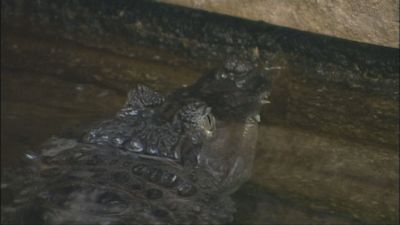Report shows South East has greatest numbers of animals from wild breeds kept as pets

ITV Meridian's Toby Winson's report features some wild animals kept as pets in the South East
A new report reveals more than 2,700 privately owned animals from wild breeds are being kept as pets, with the greatest numbers being in the South East.They include two tigers in Dover, a zebra in Maidstone, wild cats in Wealden and a crocodile in Canterbury.
Wildlife charity the Born Free Foundation said an overhaul of current legislation on the keeping of animals categorised as dangerous is a “matter of urgency”.
Lisa Marie Bearman from Rochester has kept marmoset monkeys in her garden for 13 years.
They are one species of primate that you do not currently need a licence to own.
Lisa Marie says: "I've loved monkeys all my life, from growing up a young child and it was just a conversation that we had, 'Can we have a monkey?'
"We then realised that they needed so much more room and that's when my husband Matt then started to build his first enclosure."
The RSPCA say marmosets are not suitable pets, Lisa agrees and says: "The care, the detail that is needed in owning primates.
"Primates need to live outside, they need their own kind. A primate as a pet, I think, is not the way to go."
Marmoset monkeys are the most commonly kept primate in the UK but if government proposals become law, every owner will need a licence by 2026.
Figures obtained by the charity through freedom of information requests to councils show 2,727 exotic animals are permitted to be privately owned under the Dangerous Wild Animals Act 1976.
Of the 126 local authorities which said they issued licences, more than 200 wild cats and 250 primates were covered.
There were also about 400 venomous snakes, which Born Free estimates is 10 times more than the number kept in zoos.
Born Free’s head of policy, Dr Mark Jones said: "It is unbelievable that, in this day and age, so many dangerous animals, including big cats, large primates, crocodiles and venomous snakes, continue to be legally kept in people’s homes in the UK.
"Increasing demand for and trade in all kinds of wild animals as exotic pets, puts owners and the wider public at risk of injury or disease.
"It also results in serious animal suffering, and the demand increases the pressure on many wild populations which are often already under threat,” he added.
The figures show every region across England, Wales and Scotland had licences for dangerous wild animals.
The south-east of England was the region with the most dangerous wild animals. It had the highest number of primates, crocodilians and venomous snakes.
The East of England had the highest number of wild cats, with licences permitting more than 60 cats – including several leopards, cheetahs, and lynxes.
The charity’s captivity research officer, Chris Lewis said: “The Dangerous Wild Animals Act was intended to make the keeping of such animals categorised as ‘dangerous’ a wholly exceptional circumstance.
“However, Born Free’s ongoing research paints a very different picture.”
He added: “The regulations pertaining to the keeping and trading of wild animals kept as pets are in urgent need of review.”
Born Free said it is especially concerned by the popularity of owning small wild cats: with 53 serval cats and 43 hybrid cats recorded, they were the most licenced species on the list.
The number of lemurs owned under these licences increased from 151 in 2020 to 175 last year.
A Department for Environment, Food and Rural Affairs spokesperson said anyone wishing to keep an animal under the Dangerous Wild Animals Act must be vetted and apply for a licence which sets out conditions on caring for the animal.
They added: “We keep this legislation under regular review to ensure it remains effective in keeping the public safe.”
They said the Government increased the maximum prison sentence for animal cruelty to five years in 2021.
It added it is currently bringing forward legislation to prohibit primates being kept as domestic pets. The legislation will create a new licensing scheme setting stricter rules for private owners.
Have you heard our new podcast Talking Politics? Every week Tom, Robert and Anushka dig into the biggest issues dominating the political agenda…